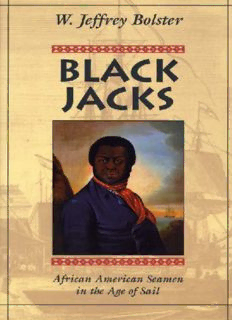
Black Jacks: African American Seamen in the Age of Sail PDF
Preview Black Jacks: African American Seamen in the Age of Sail
BLACK JACKS [To view this image, refer to the print version of this title.] BLACK JACKS African American Seamen in the Age of Sail W. JEFFREY BOLSTER HARVARD UNIVERSITY PRESS , , 1997 Copyright © 1997 by the President and Fellows of Harvard College All rights reserved Printed in the United States of America Fourth printing, 1998 First Harvard University Press paperback edition, 1998 Designed by Marianne Perlak Bob Marley and Peter Tosh, “Get Up, Stand Up,” © 1974 Fifty-six Hope Road Music, Ltd., Odnil Music, Ltd., and Stuck on Music. Reprinted by permission of PolyGram Music Publishing. Langston Hughes, “The Negro Speaks of Rivers,” from Selected Poems by Langston Hughes, © 1926 by Alfred A. Knopf, Inc., and renewed 1954 by Langston Hughes. Reprinted by permission of Alfred A. Knopf, Inc., and Harold Ober Associates Incorporated. Library of Congress Cataloging-in-Publication Data Bolster, W. Jeffrey. Black jacks : African American seamen in the age of sail / W. Jeffrey Bolster. p. cm. Includes bibliographical references (p. ) and index. ISBN 0-674-07624-9 (cloth) ISBN 0-674-07627-3 (pbk.) 1. Afro-American merchant mariners—History. 2. Sailing ships— United States—History. I. Title. VK221.B65 1997 387.5′08996073—dc20 96-44928 For Molly, in remembrance and expectation of all our voyages PREFACE H once strove for objectivity, veiling themselves in books whose sources alone were meant to tell the tale. Fashions change. Today, as scholars openly mediate among themselves, their read- ers, and their subjects (and strive to comprehend their own biases), confessionals seem more appropriate. It may be germane that I am not black; again, possibly germane that I am a seaman of sailing ships. For ten years I followed the sea to many of the places explored here. Along the way I listened to stories told by veteran skippers and seamen, many of them black West Indians recounting with the longing of old men their youthful exploits—carrying cattle under sail from the eastern Caribbean to Santo Domingo; careening their schooners at Grenada; jamming a sloop hard on the wind from Virgin Gorda to St. Martin; and steering by the stars long before those islands had looming electric lights, and longer still before they had ever graced a souvenir t-shirt. One night in the 1970s, as we were rolling before the northeasterly trades on a passage to Cape Haitian, a shipmate aboard the schooner Harvey Gamage lent me the remarkable eigh- teenth-century autobiography of an accomplished slave sailor named Olaudah Equiano, who himself had once sailed that route. Where, I asked, was the bridge between historic slave sailors and the old black schoonermen I knew? How could one understand early black America without recognizing that plantations were connected to a larger world of black people, as well as to world markets, by black viii Preface seamen? And given seaports’ historic function as crossroads for people and ideas, what roles had sailors played in the formation of black America? When I left the sea I returned to those questions about African Americans’ maritime history. This book is my answer. CONTENTS Introduction: To Tell the Tale 1 1. The Emergence of Black Sailors in Plantation America 7 2. African Roots of Black Seafaring 44 3. The Way of a Ship 68 4. The Boundaries of Race in Maritime Culture 102 5. Possibilities for Freedom 131 6. Precarious Pillar of the Black Community 158 7. Free Sailors and the Struggle with Slavery 190 8. Toward Jim Crow at Sea 215 Tables 233 Notes 241 Acknowledgments 297 Index 301
Description: